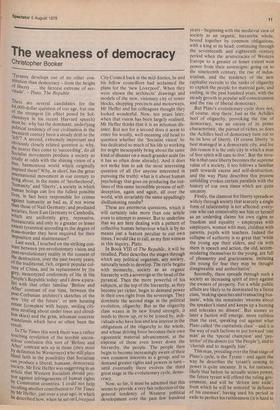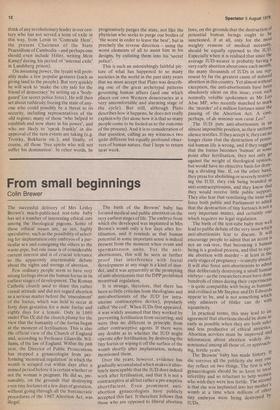The weakness of democracy
Christopher Booker
`Tyranny develops out of no other constitution than democracy — from the height of liberty . . . the fiercest extreme of servitude'. — Plato, The Republic There are several candidates for the 64,000-dollar question of our age, but one of the strongest (in effect posed by Solzhenitsyn in his recent Harvard speech) must be: why has the dominant, underlying Political tendency of our civilisation in the twentieth century been a steady drift to the left'? A second, extremely important and Obviously closely related question is: why, the nearer they come to `succeeding', do all Socialist movements produce a society so totally at odds with the shining vision of a free, harmonious world which originally inspired them? Why, in short; has the great international movement in our century to bring about, in the name of 'brotherhood', 'humanity' and liberty', a society in which human beings can live the fullest possible lives, in fact been responsible for crimes against humanity as bad as, if not worse than those of Nazi Germany; and produced societies, from East Germany to Cambodia, which are uniformly grey, repressive, bureaucratic and only to a greater or lesser extent tyrannical according to the degree of tn, ass-murder they have required for their anisosition and maintenance? Last week, I touched on the striking contrast between pre-revolutionary vision and Post-revolutionary reality in the context of the destruction, over the past twenty years, of the traditional, rich, organic popular culture of China, and its replacement by the greY, stereotyped conformity of life in the People's Republic today: and I drew a parallel with that other familiar `Before and After' contrast of our time, between the Post-Corbusian architect's sketches of the new `city of the future', or new housing estate (complete with happy, smiling citizens strolling about under trees and cloudless skies) and the grim, inhuman concrete wastelands which have so often been the result.
In The Times this week there was a rather touching revelation of the terrible unconscious confusion this sort of `Before and After' contrast sets up in those (they must by definition be Westerners) who still place blind faith in the possibility that Socialism can produce a liberal, humane, democratic society. Mr Eric Heffer was suggesting in an article that Western Socialists should protest against infringements of human rights by Communist countries. I could not help recalling another contribution to The Times by Mr Heffer, just over a year ago, in which he described how, when he sat on Liverpool
City Council back in the mid-Sixties, he and his fellow councillors had acclaimed the plans for the `new Liverpool'. When they were shown the architects' drawings and models of the new, visionary city of tower blocks, shopping precincts and motorways, Mr Heffer and his colleagues thought they looked wonderful. Now, ten years later, when that vision has been largely realised, Mr Heffer thinks that it is an inhuman disaster. But not for a second does it seem to enter his woolly, well-meaning old head to question whether the `Socialist vision' he has dedicated so much of his life to working for might inescapably bring about the same kind of disaster on a much grander scale (as it has so often done already). And it does not strike him to ask the most interesting question of all (for anyone interested in pursuing the truth): what is it about human psychology that goes on producing the outlines of this same incredible process gf selfdeception, again and again, all over the world, with invariably the same appallingly disillusioning results?
These are enormous questions, which it will certainly take more than one article even to attempt to answer. But to underline that we are here dealing with a pattern of collective human behaviour which is by no means just a feature peculiar to our own times, I would like to call, as my first witness in this inquiry, Plato.
In Book VIII of The Republic, it will be recalled, Plato describes the stages through which any political organism, any society, naturally tends to develop. The cycle begins with monarchy, society as an organic hierarchy with a sovereign at the head of the pyramid. Then the more powerful of his subjects, at the top of the hierarchy, as they become yet richer, begin to demand power in their own right from the sovereign. They dominate the second stage in the political evolution, oligarchy. But as the oligarchy class waxes in its new found strength, it tends to throw up, or to be joined by, individuals who have less and less interest in the obligations of the oligarchy to the whole, and whose driving force becomes their own egocentric material advancement, at the expense of those even lower down the hierarchy, the people. The people then begin to become increasingly aware of their own common interests as a group, and to demand greater rights and powers in turn — until eventually there evolves the third great stage in the evolutionary cycle, democracy.
Now, so far, it must be admitted that this seems to provide a very fair reflection of the general tendency of Western political development over the past few hundred years— beginning with the medieval view of society as an organic, hierarchic whole, bound together by common obligations, with a king at its head; continuing through the seventeenth and eighteenth century period when the aristocracies of Western Europe to a greater or lesser extent won power from their sovereigns; going on to the nineteenth century, the rise of industrialism, and the tendency of the new capitalist recruits to the ranks of oligarchy to exploit the people for material gain; and ending, in the past hundred years, with the steady growth in popular self-consciousness and the rise of liberal democracy.
But Plato's evolutionary cycle does not, of course, stop there. Just as the Achilles heel of oligarchy, provoking the rise of democracy, was an excess of its prime characteristic, the pursuit of riches, so does the Achilles heel of democracy turn out to be its love of liberty. Of course liberty `is best managed in a democratic city, and for this reason it is the only city in which a man of free spirit will care to live'. But the trouble is that once liberty becomes the supreme value of a society, it too follows a familiar path towards excess and self-destruction; and the way Plato describes this process unfolding evokes certain parallels with the history of our own times which are quite uncanny.
Firstly, the clamour for liberty spreads so widely through society that scarcely a single form of relationship is not affected: everyone who can conceivably see him or herself as an underdog claims his own rights to freedom and equality — employees with employers, women with men, children with parents, pupils with teachers. Indeed the collapse of authority is so great that 'while the young ape their elders, and vie with them in speech and action, the old, accommodating themselves to the young, are full of pleasantry and graciousness, imitating the young for fear they may be thought disagreeable and authoritative'.
Secondly, there spreads through such a society an increasing spirit of envy against the owners of property. For a while public affairs are likely to be dominated by a fierce class, 'making speeches and transacting business', while the remainder 'swarms about the speaker's stand and keeps up a buzzing and tolerates no dissent'. But sooner or later a faction will emerge, more ruthless than the rest, speaking out against what Plato called `the capitalistic class' — and it is the way of such factions to put forward `one man' as the `special champion' and `protector' of the demos (or `the People'), and to `cherish and to magnify him'.
This man, presiding over the final stage of Plato's cycle, is the Tyrant — and again the way he describes the tyrant's coming to power is quite uncanny. It is, for instance, likely that before he actually seizes power, the future tyrant will offend the ruling government, and will be 'driven into exile', from which he will be restored `in defiance of his enemies', having used his period in exile to perfect his ruthlessness (it is hard to
think of any revolutionary leader in our century who has not served a term of exile in this way, from Lenin to 'Comrade Hem', the present Chairman of the State Praesidium of Cambodia — and perhaps one should even include Hitler, writing Mein Kampf during his period of 'internal exile' in Landsberg prison).
On assuming power, the tyrant will probably make a few popular gestures (such as giving land to the people). But very quickly he will seek to 'make the city safe for the friend of democracy' by setting up a 'bodyguard' (or secret police force). He will then set about ruthlessly freeing the state of anyone who could possibly be a threat to its security, including representatives of the old regime; many of those 'who helped to establish and now share in his power', and who are likely to 'speak frankly' in disapproval of the turn events are taking (e.g. Trotsky, Bukharin etc.); and finally, of course, all those 'free spirits who will not suffer his domination'. In other words, he progressively purges the state, not like the physician who seeks to purge our bodies of 'the worst in order to leave the best', but in precisely the reverse direction — using the worst elements of all to assist him in his designs, by enlisting them into his 'secret police'.
This is such an astonishingly faithful picture of what has happened to so many societies in the world in the past sixty years that we must accept that Plato was describing one of the great archetypal patterns governing human affairs (and one which places our own Western democracies at a very uncomfortable and alarming stage of the cycle). But still, although Plato describes how it happens, he does not really explain why (let alone how it is that so many people come to be fooled as to the outcome of the process). And it is to consideration of that question, calling as my witnesses two quite different but equally profound observers of human nature, that I hope to return next week.































 Previous page
Previous page